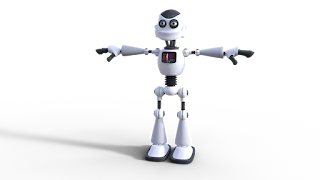As San Francisco's residents shelter in place, coyotes are emerging on the streets; A Harvard Working Paper gives best practices for business to use in preparation for novel risks; A training simulator aims to make autonomous safer before encountering real-world roads; An article suggests using wastewater sampling to identify drug usage trends; and a Steem post offers two web sites with learn-at-home resources for students
Saturday, March 28, 2020
Curating the Internet: Science and technology digest for March 28, 2020
Labels:
artificial intelligence,
Autonomous Vehicles,
business,
Drug Abuse,
Education,
Law Enforcement,
Nature,
Novel Risk,
physics,
Programming,
Public Health,
Reinforcement Learning,
Risk,
San Francisco,
Wildlife
Friday, March 27, 2020
Curating the Internet: Science and technology digest for March 27, 2020
A TED talk describing the "code for Venezuela" project and its emergent solutions; A new app helps researchers track coronavirus and learn about risks; Google eliminating the "User Agent" string from its Chrome browser; DIY face shield finds its way into hospitals and onto Ford's production floor; and a Steem embedded video discussing the nature of the US election system
Thursday, March 26, 2020
Curating the Internet: Science and technology digest for March 26, 2020
MIT researchers submit a $100 open source ventilator for FDA approval; Chinese company offers facial recognition for people wearing masks; A new AI system approaches 100% accuracy on cancer diagnoses; A Cold-War era submarine wreck is located off the coast of Oahu, Hawaii; and a Steem post argues that surveillance may be useful for COVID-19 in the short term, but it poses long term risks
Wednesday, March 25, 2020
Curating the Internet: Science and technology digest for March 25, 2020
Storj Labs launches decentralized cloud storage service, Tardigrade; Brave browser teams up with Binance to offer in-browser cryptocurrency trading; Recent evidence suggests that Schizophrenia may be an autoimmune condition; Lawyers advise to switch of smart-devices when working from home and discussing confidential information; and a Steem essay informs us that home tests for coronavirus can now be purchased online (when they're not sold out)
Tuesday, March 24, 2020
Curating the Internet: Science and technology digest for March 24, 2020
A TED talk gives the research history of the so-called "sex chromosomes"; Scientific theories behind the deja vu experience; A new attack tricks artificial intelligence systems into mischaracterizing images; Cancer research retracted after 14 years and more than 900 citations; and a Steem essay describes a doctor's efforts to prepare for coronavirus in Bangladesh
Monday, March 23, 2020
Curating the Internet: Science and technology digest for March 23, 2020
Jaron Lanier and Glen Weyl argue for data dignity, suggesting that human contributions to AI systems need to be accounted for; Microsoft Windows' Explorer and Start Menu may be getting a new look; Firefox continues its slow elimination of the unencrypted ftp protocol; Microsoft responds to allegations that the Edge browser is bad at privacy; and a Steem essay discussing Superworms that can survive by eating plastic
Labels:
ai,
artificial intelligence,
biology,
cybersecurity,
Data Dignity,
Encryption,
Environment,
Firefox,
FTP,
Glen Weyl,
information security,
infosec,
Jaron Lanier,
Microsoft,
privacy,
Windows,
Windows 10
Sunday, March 22, 2020
Curating the Internet: Science and technology digest for March 22, 2020
IEEE Spectrum's weekly selection of awesome robot videos; A new technique is able to decipher ancient languages by comparing to modern languages along with existing translations; An archaeologist is saving a digital archive of historic sites in the Yukon and using it to create an online virtual exhibit; George R. R. Martin says he's spending coronavirus down-time writing about Westeros; and a Steem essay describes an algorithm to find a longest substring with no repeating characters
Saturday, March 21, 2020
Curating the Internet: Science and technology digest for March 21, 2020
Stanford soft robot operates without hydraulics or pneumatics; $1 million Turing award goes to Pixar pioneers in computer graphics; Developer acceptance increasing for Windows Subsystem for Linux; New map of the Milky Way galaxy reveals at least four spiral arms; and a Steem photo-essay tells us about the mineral, amethyst
Friday, March 20, 2020
Curating the Internet: Science and technology digest for March 20, 2020
Whitehouse promotes machine learning for coronavirus solutions; Security advice for the emerging work-from-home employers; Chloroquine and hydrochloroquine may offer low cost and effective treatment against COVID-19 and other viruses; How the coronavirus pandemic is permanently reshaping the business landscape; and a Steem essay acknowledges limited data, but argues that - at the moment - coronavirus infections are not growing at an exponential rate
Labels:
business,
Chloroquine,
Coronavirus,
COVID-19,
cybersecurity,
Hydorxychloroquine,
information security,
infosec,
Machine Learning,
Pandemic,
Policy,
Strategy,
Supply Chain,
Work from home
Thursday, March 19, 2020
Curating the Internet: Science and technology digest for March 19, 2020
Ultrasonic attack can break into cell phones through a solid surface; Monkeys develop immunity to SARS-CoV-2 after first infection; Hiker finds two bombs from 1935 in a Hawaiian volcano; Commentary arguing that once a medical treatment comes into common practice, it persists long after it's found to be useless, or even harmful; and a Steem essay describing a dive to the USS Oriskany aka The Great Carrier Reef
Tuesday, March 17, 2020
Curating the Internet: Science and technology digest for March 18, 2020
A TED talk discusses human comfort levels with artificial intelligence systems; Commentary suggests that working from home was normal and expected for much of human history; An open access database contains metadata from 29,000 coronavirus studies and full text from 13,000; The TSA is now permitting larger bottles of hand sanitizer on flights, and Bruce Schneier argues that this is an implicit concession that the ban was never needed; and a Steem essay describing the Rhoeo Discolor, a plant that grows in South and Central America
Curating the Internet: Science and technology digest for March 17, 2020
Brave Browser files GPDR complaint against Google, claims Google violates "purpose limitation principle"; Study suggests that mothers have implicit bias about emotional expression between genders, fathers don't; Researchers suggest there is no underlying cause to mood disorders; Microsoft Teams buckled when telecommuting Europe showed up for work; and a Steem essay discussing essential aspects of remote learning
Labels:
Brave Browser,
Collaboration,
cybersecurity,
Education,
Gender Bias,
Google,
GPDR,
Implicit Bias,
information security,
infosec,
Microsoft,
Online Learning,
privacy,
Psychology,
Remote Learning,
Telecommuting
Monday, March 16, 2020
Curating the Internet: Science and technology digest for March 16, 2020
5G wireless is driving up the cost of smartphones; Doctors in Israel removed an entire lung from a patient, eliminated all cancerous cells, then reattached the lung; Whisper app for secret sharing revealed individuals' locations, ages, and other details; Advice for people who are working from home because of the coronavirus; and a Steem post describing a youtube video where chickens were hatched from store-bought eggs
Labels:
5G,
Agriculture,
biology,
Blackmail,
Cancer,
cybersecurity,
information security,
infosec,
Medicine,
privacy,
Smart Phones,
Surgery,
telecommunications,
Telecommuting,
Whisper,
Wireless
Sunday, March 15, 2020
Curating the Internet: Science and technology digest for March 15, 2020
Previously unseen footage of a Thylacine or Tasmanian Tiger; IEEE Spectrum's weekly selection of awesome robot videos; Microsoft announces the end of the line for the Visual Basic programming language; Researchers adapt flu prediction methods to the novel coronavirus; and a Steem essay describing the race to blanket the Earth in satellite-based Internet coverage
Labels:
CDC,
Coronavirus,
Extinction,
Forecasting,
History,
IEEE Spectrum,
internet,
Microsoft,
OneWeb,
Programming,
robotics,
Satellites,
space,
StarLink,
Tasmanian Tiger,
Thylacine,
Visual Basic
Saturday, March 14, 2020
Curating the Internet: Science and technology digest for March 14, 2020
An electric motorcycle that's constructed from wood is on pre-sale for 2021 deliver; Coinbase announces BTC transaction batching in order to reduce fees and overhead; A cryptography pioneer discusses election security; Firefox add-on puts Facebook in its own container to limit snooping; and a Steem essay discusses the science behind snoring
Friday, March 13, 2020
Curating the Internet: Science and technology digest for March 13, 2020
Autonomous robots deployed to sterilize hospitals in China; Los Angeles Department of Water and Power accused of cybersecurity coverup; People with celiac disease may soon be able to eat gluten; IBM upgrading Watson to include advances from Project Debater; and a Steem photo-essay describes the engineering of a hundred year old Brownie camera
Labels:
artificial intelligence,
Automation,
Celiac Disease,
COVID-19,
cybersecurity,
Engineering,
ibm,
information security,
infosec,
Medical Research,
Medicine,
Photography,
Project Debater,
robotics,
Watson
Thursday, March 12, 2020
Curating the Internet: Science and technology digest for March 12, 2020
Hunter gatherers wear fitbits and researchers say they're just as sedentary as modern societies.; A caution against harming the weakest students by moving classes online; Physicist suggests that dark matter may be comprised of a six-quark particle (hexaquark); Audit finds hospitals at risk of hacking do to obsolete systems; and a Steem essay describing the profession of an underwater archaeologist
Labels:
Anthropology,
archaeology,
COVID-19,
cybersecurity,
Dark Matter,
Education,
Finance,
Hexaquarks,
Hospitals,
Hunter-gatherers,
information security,
Remote Learning,
Underwater Archaeology
Wednesday, March 11, 2020
Curating the Internet: Science and technology digest for March 11, 2020
A robot inspired by baby deer that can teach itself to walk; Brave Browser partners with TAP Network to connect BAT tokens directly to retailers; A fireside chat including the controversial and eccentric Craig Wright and economist George Gilder; Master's thesis finds that rocks from Earth and Moon are less similar than previously believed; and a Steem essay discussing the theoretical possibility of "bubbles of nothing" that could destroy the universe
Labels:
Astrophysics,
Basic Attention Token,
Brave Browser,
BSV,
Craig Wright,
Cryptocurrency,
George Gilder,
Metanet,
moon,
Nature Inspired Computing,
physics,
robotics,
Rocks,
String Theory,
Theia,
Walking
Tuesday, March 10, 2020
Curating the Internet: Science and technology digest for March 10, 2020
Automatic pricing algorithms could reduce competition and raise consumer prices; Robot swarm achieves goals without central orchestration; Lettuce grows on the International Space Station (ISS); Google releases open source TensorFlow Quantum to streamline quantum machine learning; and a @steemhunt post that draws attention to a children's exotrainer for repairing muscular atrophy
Labels:
Agriculture,
ai,
artificial intelligence,
business,
Exoskeleton,
Exosuit,
Exotrainer,
Google,
ISS,
Machine Learning,
neural networks,
Pricing,
Quantum Computing,
robotics,
space,
Swarms,
TensorFlow Quantum
Monday, March 9, 2020
Curating the Internet: Science and technology digest for March 9, 2020
Study finds that low-carb diets may prevent and reverse age-related cognitive decline; IEEE Spectrum's weekly selection of awesome robot videos from March 6.; a Steem essay describing the current state of knowledge on the novel coronavirus (COVID-19); A podcast argues that bitcoin mining might be returning to the US, and that it might represent a new business model for power plants; and a TED talk describing research into how specific neural pathways in the brain impact behavior
Sunday, March 8, 2020
Curating the Internet: Science and technology digest for March 7, 2020
Harvard Working Paper suggests that occupational licensing reduces competition and fails to improve consumer satisfaction; More on the health-care robot that automates needle insertion for blood draws and fluid delivery; Glassware in Japan dates to Persian dynasty between years 226 and 551; Study in Finland finds that pet dogs are surprisingly anxious and stressed; and a Steem photo-essay with original nature-photography from Bangladesh
Labels:
Anxiety,
archaeology,
Automation,
business,
Dogs,
Health Care,
Japan,
Nature photography,
Observations,
Occupational Licensing,
Persia,
Policy,
robotics,
Sassanian dynasty,
Stress,
Wildlife
Friday, March 6, 2020
Curating the Internet: Science and technology digest for March 6, 2020
A TED talk by a security researcher gives a rundown on "stalkerware"; A Youtube video addresses Peto's Paradox - the surprising observation that larger animals are less likely to get cancer; Microsoft announces a free tier of its Cosmos DB NoSQL database; Twitter is testing fleets, transient tweets that expire after 24 hours; Brave Browser announces a state of the art privacy enhancement; and a Steem essay discusses the nature, causes, and treatments for post-traumatic stress disorder
Thursday, March 5, 2020
Curating the Internet: Science and technology digest for March 5, 2020
Partnership between Boston Dynamics and Otto Motors makes warehouse automation safer; A paper claiming a link between the Sun and global warming was retracted. The authors dispute the action.; Computers suggest that between 1700 and 1910, Beethoven was the most influential piano composer and Rachmaninoff was the most innovative; A new AI chip makes image recognition much faster; and a Steem author reviews the Brave Browser
Wednesday, March 4, 2020
Curating the Internet: Science and technology digest for March 4, 2020
Honeywell claims quantum breakthrough that's twice as powerful as IBM and Google offerings; A satirical browser extension responds to the coronavirus by adding medical masks to images that contain faces; British historians find a secret door in Parliament's House of Commons; Twitter gives blue check mark to fake politician invented by high school student; and a Steem essay discusses incision and drainage as a treatment for subcutaneous abscess
Tuesday, March 3, 2020
Curating the Internet: Science and technology digest for March 3, 2020
Dogs' noses can sense the ambient warmth of their prey from a meter and a half away; "Fake news" didn't have much impact on the 2016 election; An attempt at estimating numbers of unreported cases of the novel coronavirus (COVID-19); Xerox offers $24 per share to buy HP. HP says no thank you.; and a Steem "citizen science" photo-essay with bird photography and siting counts
Monday, March 2, 2020
Curating the Internet: Science and technology digest for March 2, 2020
American consumers get gun-shy after data breaches; The Brave browser adds feature to do Wayback Machine look-ups for missing web pages; Ex-Googler, Eric Schmidt, argues for massive investment in emerging technologies and intellectual capital; Another safety and feasibility trial finds that CRISPR gene editing is safe for cancer therapies; and a Steem post with photos of the ATLAS comet (Comet C/2019 Y4)
Labels:
artificial intelligence,
Astronomy,
Biotechnology,
Brave Browser,
business,
Cancer,
Comets,
CRISPR,
cybersecurity,
Funding,
information security,
New Features,
Policy,
privacy,
Quantum Information Science
Sunday, March 1, 2020
Curating the Internet: Science and technology digest for March 1, 2020
IEEE Spectrum's weekly selection of awesome robot videos; A report on browser privacy finds that Brave leads the pack, Microsoft Edge and Yandex trail; Theorists still don't totally understand how planes fly; A new study sees brain waves as a form of "what if" testing; and a Steem essay with embedded video describing a first-hand observation of baboons in the wild
Saturday, February 29, 2020
Curating the Internet: Science and technology digest for February 29, 2020
Artificial intelligence predicts heart attacks, strokes, and even deaths better than doctors with traditional techniques; Unisys CEO predicts a year of transition, and also a possible return of acquisition activities; Freeman Dyson was almost certainly my favorite science & technology writer. He died on Friday (Feb 28); Texas wind-power is driving a Bitcoin mining expansion in the state; and a Steem essay describing new research into leptoquarks at the Large Hadron Collider
Friday, February 28, 2020
Curating the Internet: Science and technology digest for February 28, 2020
Smithsonian Institute puts 2.8 images into the public domain; Coinbase Child pays for parent (CPFP) technique supports zero-fee BTC transactions in its custody product; The US Department of Defense has adopted principles for ethical adoption of artificial intelligence; A summary of a recent Association for Computing Machinery (ACM) conference on ethical artificial intelligence; and a Steem post that describes a biodegradable coffee cup that can be used to plant trees
Thursday, February 27, 2020
Curating the Internet: Science and technology digest for February 27, 2020
Harvard researchers find that free open source software (FOSS) comes with a cost; Small levels of daily alcohol consumption may increase longevity, but binge drinking may reduce it; A recently declassified report reveals that the NSA phone meta-data monitoring program is expensive and unproductive; An argument that researchers need to study deceptive practices that emerge naturally in artificial intelligence (AI) systems; and a Steem essay describing a recent search for dark matter in the Earth's core.
Wednesday, February 26, 2020
Curating the Internet: Science and technology digest for February 26, 2020
Researchers suggest that Moore's Law has ended and suggest a path forward; Vote-buying goes mainstream on the EOS blockchain; Tim Draper eschews stocks in favor of Bitcoin and predicts BTC $250,000 by 2022; The first known animal that doesn't breathe has been discovered; and a Steem essay talks about the use of robotics in the oil industry
Subscribe to:
Comments (Atom)





























